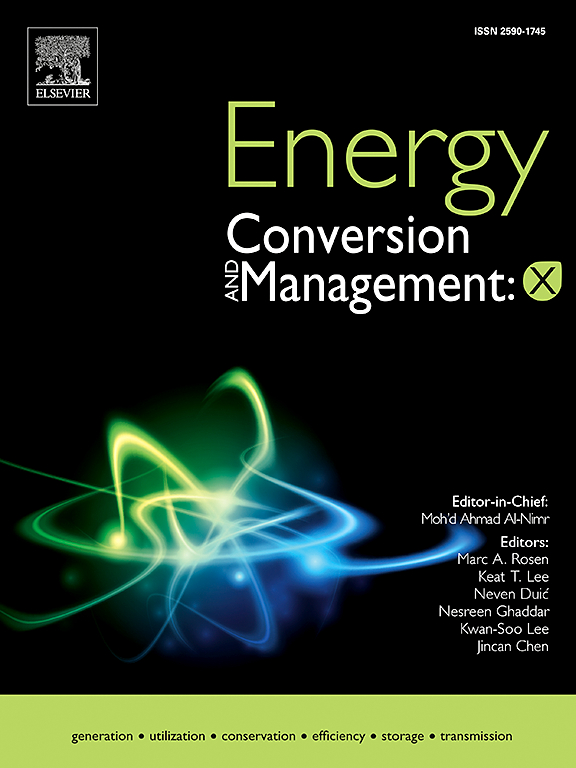Recurrent neural network strategies for decoupling energy consumption and greenhouse gas emissions in Hungary’s industrial sector
IF 7.6
Q1 ENERGY & FUELS
引用次数: 0
Abstract
This study addresses the critical challenge facing Hungary’s industrial sector by focusing on the need to decouple economic growth from greenhouse gas (GHG) emissions to meet EU climate targets while maintaining industrial productivity. Although Hungary has achieved significant emission reductions, its industrial sector remains heavily reliant on carbon-intensive energy sources, underscoring the need for advanced analytical approaches to identify effective decoupling strategies. To address this gap, the study utilizes a Recurrent Neural Network (RNN), which is effective for modeling complex, non-linear, and temporal relationships, to analyze the interactions among industrial energy consumption, economic performance, and GHG emissions from 1995 to 2020. The results indicate that reducing coal and heat consumption by 2.5 petajoules yields significant GHG emission decreases of 4.4 percent and 4.3 percent, respectively, while a similar reduction in renewables and waste leads to a 3.5 percent drop in emissions. A 2.5 petajoule reduction in natural gas consumption results in just over a 1 percent decrease in GHG emissions, highlighting its lower emissions intensity and role as a viable transitional fuel. These findings provide critical insights for designing targeted policy interventions prioritizing coal and heat reduction and scaling up low-emission renewables to meet Hungary’s climate commitments. The methodological contribution of using RNN offers a scalable and replicable framework for other countries aiming to balance industrial productivity with sustainable development objectives.
匈牙利工业部门能源消耗和温室气体排放解耦的递归神经网络策略
本研究解决了匈牙利工业部门面临的关键挑战,重点关注将经济增长与温室气体(GHG)排放脱钩的必要性,以满足欧盟的气候目标,同时保持工业生产率。尽管匈牙利已经取得了显著的减排成就,但其工业部门仍然严重依赖碳密集型能源,因此需要先进的分析方法来确定有效的脱钩战略。为了解决这一差距,该研究利用循环神经网络(RNN)来分析1995年至2020年工业能源消耗、经济绩效和温室气体排放之间的相互作用,该网络对复杂、非线性和时间关系的建模是有效的。结果表明,减少2.5焦耳的煤炭和热量消耗,温室气体排放量分别减少4.4%和4.3%,而可再生能源和废物的类似减少导致排放量下降3.5%。天然气消耗每减少2.5焦,温室气体排放量就会减少1%以上,突出了其较低的排放强度和作为可行的过渡燃料的作用。这些发现为设计有针对性的政策干预提供了重要见解,优先考虑减少煤炭和热量,扩大低排放可再生能源,以实现匈牙利的气候承诺。使用RNN在方法上的贡献为旨在平衡工业生产力与可持续发展目标的其他国家提供了一个可扩展和可复制的框架。
本文章由计算机程序翻译,如有差异,请以英文原文为准。
求助全文
约1分钟内获得全文
求助全文
来源期刊

Energy Conversion and Management-X
Multiple-
CiteScore
8.80
自引率
3.20%
发文量
180
审稿时长
58 days
期刊介绍:
Energy Conversion and Management: X is the open access extension of the reputable journal Energy Conversion and Management, serving as a platform for interdisciplinary research on a wide array of critical energy subjects. The journal is dedicated to publishing original contributions and in-depth technical review articles that present groundbreaking research on topics spanning energy generation, utilization, conversion, storage, transmission, conservation, management, and sustainability.
The scope of Energy Conversion and Management: X encompasses various forms of energy, including mechanical, thermal, nuclear, chemical, electromagnetic, magnetic, and electric energy. It addresses all known energy resources, highlighting both conventional sources like fossil fuels and nuclear power, as well as renewable resources such as solar, biomass, hydro, wind, geothermal, and ocean energy.
 求助内容:
求助内容: 应助结果提醒方式:
应助结果提醒方式:


